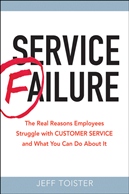Social media experiment: who has a clear purpose?
 Jeff Toister
Jeff Toister  Monday, March 8, 2010 at 8:20AM |
Monday, March 8, 2010 at 8:20AM | The social media experiment is getting interesting. I've gotten a few more responses, discovered something surprising about most of the 'participants', and added another company to the mix. Here are the updates. (Read a description of the experiment here.)
More Responses
I'm feeling a bit more encouraged today than I did on Friday. Last week, I posted a question to the Facebook pages of five of the companies in the study and only received one response. I posted a question to a sixth company over the weekend and have now received a response from three out of six companies. Even better, the answers I received were very helpful. There are still some companies that I haven't interacted with on Facebook, but I'll try to get them involved this week.
Surprising Twist
John Curran asked if any of the companies in this study had Service Level Agreements for their Facebook or Twitter pages (find John on Twitter @TrainingTsar). In other words, did they have a clear policy that described what type of service customers could expect through these outlets, such as how quickly they'd respond to inquiries. I couldn't find published service standards for any of the companies in the study, but John's question helped me realize I had overlooked something obvious:
Do these companies clearly identify their reason for being on Facebook and Twitter? It is a best practice to set clear expectations when you interact with your customers. Companies should state on their Facebook page "Here's why we have a Facebook page". Their Twitter page should contain some statement that says "Here's why you should follow us on Twitter." I checked each of the companies in the study and found a big gap:


One company's Twitter page described why you should be a fan on Facebook, but not why you should care about their Tweets (odd). Only one company had a statement of purpose on both Facebook and Twitter.
New Company
I added a 12th company to the study over the weekend. One of the unresponsive companies in the original group has a direct competitor that I also frequent. Their competitor didn't show up in my initial search on Facebook and Twitter, but I discovered over the weekend that they are in both places. Now things will get even more interesting with some head to head competition for my discretionary income!
What's ahead...
This week should prove interesting as I attempt to interact with the remaining companies in the mix. I've also decided to start revealing the companies as I reach some conclusions about their social media approach. Finally, your comments and suggestions are much appreciated!





